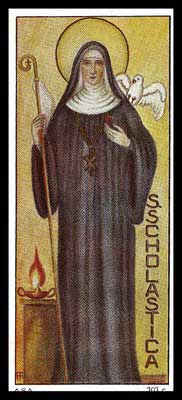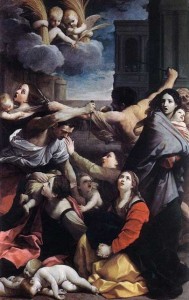 This is excellent overview of Prayer as taught by the Catechism of the Catholic Church…check it out…then pray!
This is excellent overview of Prayer as taught by the Catechism of the Catholic Church…check it out…then pray!
Devotional Prayer
The Angelus – Discerning Hearts
The Angel of the Lord declared to Mary: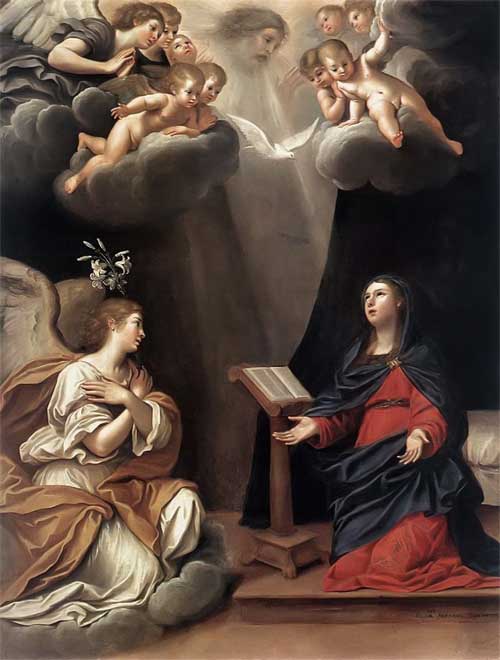
Hail Mary, full of grace, the Lord is with thee; blessed art thou among women and blessed is the fruit of thy womb, Jesus. Holy Mary, Mother of God, pray for us sinners, now and at the hour of
our death. Amen.
Behold the handmaid of the Lord: Be it done unto me according to Thy word.
And the Word was made Flesh: And dwelt among us. Hail Mary . . .
Hail Mary . . .
Pray for us, O Holy Mother of God, that we may be made worthy of the promises of Christ.
Let us pray:
Pour forth, we beseech Thee, O Lord, Thy grace into our hearts; that we, to whom the incarnation of Christ, Thy Son, was made known by the message of an angel, may by His Passion and Cross be brought to the glory of His Resurrection, through the same Christ Our Lord.
Amen.
“Hail, full of grace, the Lord is with you” (Lk 1:28)
“Blessed are you among women,
and blessed is the fruit of your womb”
(Lk 1:42).
Tuesday 1st Week of Lent – Daily Reading and Reflection on the Gospel from the Mass – Discerning Hearts
“If you forgive men their trespasses, your heavenly Father also will forgive you”
Podcast (daily-scripture): Play in new window | Download (Duration: 4:05 — 3.7MB) | Embed
an excerpt from today’s reflection by Don Schwager:
We can approach God confidently because he is waiting with arms wide open to receive his prodigal sons and daughters. That is why Jesus 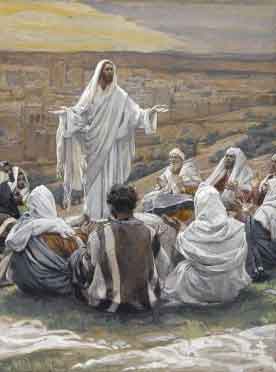 gave his disciples the perfect prayer that dares to call God, Our Father. This prayer teaches us how to ask God for the things we really need, the things that matter not only for the present but for eternity as well. We can approach God our Father with confidence and boldness because Christ has opened the way to heaven for us through his death and resurrection. When we ask God for help, he fortunately does not give us what we deserve. Instead, he responds with grace, mercy, and kindness. He is good and forgiving towards us, and he expects us to treat our neighbor the same. God has poured his love into our hearts through the gift of the Holy Spirit (Romans 5:5). And that love is like a refining fire – it purifies and burns away all prejudice, hatred, resentment, vengeance, and bitterness until there is nothing left but goodness and forgiveness towards those who cause us grief or harm.
gave his disciples the perfect prayer that dares to call God, Our Father. This prayer teaches us how to ask God for the things we really need, the things that matter not only for the present but for eternity as well. We can approach God our Father with confidence and boldness because Christ has opened the way to heaven for us through his death and resurrection. When we ask God for help, he fortunately does not give us what we deserve. Instead, he responds with grace, mercy, and kindness. He is good and forgiving towards us, and he expects us to treat our neighbor the same. God has poured his love into our hearts through the gift of the Holy Spirit (Romans 5:5). And that love is like a refining fire – it purifies and burns away all prejudice, hatred, resentment, vengeance, and bitterness until there is nothing left but goodness and forgiveness towards those who cause us grief or harm.
Do you treat others as you think they deserve to be treated, or do you treat them as the Lord has treated you – with mercy, steadfast love, and kindness?
“Father in heaven, you have given me a mind to know you, a will to serve you, and a heart to love you. Give me today the grace and strength to embrace your holy will and fill my heart and mind with your truth and love that all my intentions and actions may be pleasing to you. Help me to be kind and forgiving towards my neighbor as you have been towards me.”
for the full reflection visit : Daily Reading and Meditation
St. Scholastica, pray for us – Discerning Hearts
Litany of Saint Scholastica
Origin of this litany unknown, but in all details it follows the constant practice and pattern of Medieval litanies; this translation is from St. Benedict’s Manual (1875, 1879, Frederick Pustet). Note the invocation “prevented by the grace of Christ Our Lord,” a now archaic use of “prevented” but which once meant to be helped or succored.
Lord have mercy on us. Lord have mercy on us. Christ have mercy on us. Christ have mercy on us. Lord have mercy on us. Lord have mercy on us. Christ hear us. Christ graciously hear us.
God the Father of Heaven, Have mercy on us. God the Son, Redeemer of the world, Have mercy on us. God the Holy Ghost, Have mercy on us. Holy Trinity, one God, Have mercy on us.
Holy Mary, Pray for us. Holy Mother of God, Pray for us. Holy Virgin of virgins, Pray for us. Saint Scholastica, Pray for us. St. Scholastica, true sister of St. Benedict, Pray for us. St. Scholastica, chosen by God from eternity, Pray for us. St. Scholastica, prevented by the grace of Christ Our Lord, Pray for us. St. Scholastica, consecrated to God from thy infancy, Pray for us. St. Scholastica, always a virgin incorrupt, Pray for us. St. Scholastica, espoused to Jesus Christ, Pray for us. St. Scholastica, scholar of the Holy Ghost, Pray for us. St. Scholastica, mirror of innocence, Pray for us. St. Scholastica, model of perfection, Pray for us. St. Scholastica, pattern of virtues, Pray for us. St. Scholastica, glory of the monastic life, Pray for us. St. Scholastica, mother of numberless virgins, Pray for us. St. Scholastica, imitator of the angelic life, Pray for us. St. Scholastica, full of faith in God, Pray for us. St. Scholastica, replenished with hope of the goods of heaven, Pray for us. St. Scholastica, ever burning with the love of thy Spouse, Pray for us. St. Scholastica, resplendent with humility, Pray for us. St. Scholastica, trusting as a daughter in the Lord, Pray for us. St. Scholastica, intent on prayer, Pray for us. St. Scholastica, quickly heard by the Lord, Pray for us. St. Scholastica, famed for the praise of perseverance, Pray for us. St. Scholastica, who didst enter the courts of Heaven in the form of a dove, Pray for us. St. Scholastica, who dost now follow the Lamb whithersoever He goeth, Pray for us. St. Scholastica, who dost rejoice in delights of thy Spouse for ever, Pray for us. St. Scholastica, adorned with a crown of glory, Pray for us. St. Scholastica, advocate with God of those who invoke thee, Pray for us. St. Scholastica, generous patron of those who imitate thee, Pray for us. St. Scholastica, holy and innocent virgin, Pray for us.
We sinners: Beseech thee, Saint Scholastica, to hear us.
That thou deign to help us, by thy most holy and efficacious prayers to God, We beseech thee, hear us. That thou deign to cherish and preserve, by thy protection, the Benedictine Order (and this monastery) and all who dwell therein, We beseech thee, hear us. (That thou admit us into the number of thy children,) We beseech thee, hear us. That thou deign to raise up, increase, and preserve our devotion toward thee, We beseech thee, hear us. (That thou deign to preserve in us the perfect observance of the Rule of thy blessed brother, our most holy Father Saint Benedict,) We beseech thee, hear us. That thou deign by thy supplications, to moisten the dryness of our hearts with the dew of heavenly grace, We beseech thee, hear us. That, by thy intercession, thou mayest eternally unite us to Christ, the Spouse of our souls, We beseech thee, hear us. That thou mayest lead us to eternal joys, and to Jesus, (our most sweet Spouse), We beseech thee, hear us. That thou wouldst vouchsafe to hear us, We beseech thee, hear us.
Lamb of God, Who takest away the sins of the world: Spare us, O Lord. Lamb of God, Who takest away the sins of the world: Graciously hear its, O Lord. Lamb of God, Who takest away the sins of the world: Have mercy on us.
V. Pray for us, O holy Virgin Scholastica: R. That we may be made worthy of the promises of Christ.
Let us pray. O God, Who, to show the innocence of her life, didst cause the soul of Thy blessed Virgin Scholastica to ascend to Heaven in the form of a dove: grant, we beseech Thee, by her merits and prayers, that we may live so innocently, as to deserve to arrive at eternal joys. Through Jesus Christ, Thine only-begotten Son, Our Lord, Who with Thee and the Holy Ghost liveth and reigneth, God, for ever and ever. R. Amen.
Prayer Source: Kyrie Eleison — Two Hundred Litanies by Benjamin Francis Musser O.F.M., The Magnificat Press, 1944
St. Scholastica, pray for us
Litany of Saint Scholastica
Origin of this litany unknown, but in all details it follows the constant practice and pattern of Medieval litanies; this translation is from St. Benedict’s Manual (1875, 1879, Frederick Pustet). Note the invocation “prevented by the grace of Christ Our Lord,” a now archaic use of “prevented” but which once meant to be helped or succored.
Lord have mercy on us. Lord have mercy on us. Christ have mercy on us. Christ have mercy on us. Lord have mercy on us. Lord have mercy on us. Christ hear us. Christ graciously hear us.
God the Father of Heaven, Have mercy on us. God the Son, Redeemer of the world, Have mercy on us. God the Holy Ghost, Have mercy on us. Holy Trinity, one God, Have mercy on us.
Holy Mary, Pray for us. Holy Mother of God, Pray for us. Holy Virgin of virgins, Pray for us. Saint Scholastica, Pray for us. St. Scholastica, true sister of St. Benedict, Pray for us. St. Scholastica, chosen by God from eternity, Pray for us. St. Scholastica, prevented by the grace of Christ Our Lord, Pray for us. St. Scholastica, consecrated to God from thy infancy, Pray for us. St. Scholastica, always a virgin incorrupt, Pray for us. St. Scholastica, espoused to Jesus Christ, Pray for us. St. Scholastica, scholar of the Holy Ghost, Pray for us. St. Scholastica, mirror of innocence, Pray for us. St. Scholastica, model of perfection, Pray for us. St. Scholastica, pattern of virtues, Pray for us. St. Scholastica, glory of the monastic life, Pray for us. St. Scholastica, mother of numberless virgins, Pray for us. St. Scholastica, imitator of the angelic life, Pray for us. St. Scholastica, full of faith in God, Pray for us. St. Scholastica, replenished with hope of the goods of heaven, Pray for us. St. Scholastica, ever burning with the love of thy Spouse, Pray for us. St. Scholastica, resplendent with humility, Pray for us. St. Scholastica, trusting as a daughter in the Lord, Pray for us. St. Scholastica, intent on prayer, Pray for us. St. Scholastica, quickly heard by the Lord, Pray for us. St. Scholastica, famed for the praise of perseverance, Pray for us. St. Scholastica, who didst enter the courts of Heaven in the form of a dove, Pray for us. St. Scholastica, who dost now follow the Lamb whithersoever He goeth, Pray for us. St. Scholastica, who dost rejoice in delights of thy Spouse for ever, Pray for us. St. Scholastica, adorned with a crown of glory, Pray for us. St. Scholastica, advocate with God of those who invoke thee, Pray for us. St. Scholastica, generous patron of those who imitate thee, Pray for us. St. Scholastica, holy and innocent virgin, Pray for us.
We sinners: Beseech thee, Saint Scholastica, to hear us.
That thou deign to help us, by thy most holy and efficacious prayers to God, We beseech thee, hear us. That thou deign to cherish and preserve, by thy protection, the Benedictine Order (and this monastery) and all who dwell therein, We beseech thee, hear us. (That thou admit us into the number of thy children,) We beseech thee, hear us. That thou deign to raise up, increase, and preserve our devotion toward thee, We beseech thee, hear us. (That thou deign to preserve in us the perfect observance of the Rule of thy blessed brother, our most holy Father Saint Benedict,) We beseech thee, hear us. That thou deign by thy supplications, to moisten the dryness of our hearts with the dew of heavenly grace, We beseech thee, hear us. That, by thy intercession, thou mayest eternally unite us to Christ, the Spouse of our souls, We beseech thee, hear us. That thou mayest lead us to eternal joys, and to Jesus, (our most sweet Spouse), We beseech thee, hear us. That thou wouldst vouchsafe to hear us, We beseech thee, hear us.
Lamb of God, Who takest away the sins of the world: Spare us, O Lord. Lamb of God, Who takest away the sins of the world: Graciously hear its, O Lord. Lamb of God, Who takest away the sins of the world: Have mercy on us.
V. Pray for us, O holy Virgin Scholastica: R. That we may be made worthy of the promises of Christ.
Let us pray. O God, Who, to show the innocence of her life, didst cause the soul of Thy blessed Virgin Scholastica to ascend to Heaven in the form of a dove: grant, we beseech Thee, by her merits and prayers, that we may live so innocently, as to deserve to arrive at eternal joys. Through Jesus Christ, Thine only-begotten Son, Our Lord, Who with Thee and the Holy Ghost liveth and reigneth, God, for ever and ever. R. Amen.
Prayer Source: Kyrie Eleison — Two Hundred Litanies by Benjamin Francis Musser O.F.M., The Magnificat Press, 1944
St. Brigid of Kildare, a strong, gentle heart – Discerning Hearts
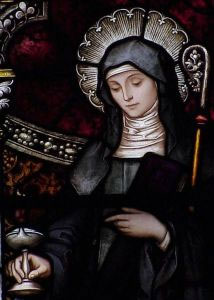 St. Brigid of Kildare, an extraordinary woman of faith, who was known for the beauty of her heart.
St. Brigid of Kildare, an extraordinary woman of faith, who was known for the beauty of her heart.
Daughter of Dubtach, pagan Scottish king of Leinster, and Brocca, a Christian Pictish slave who had been baptized by Saint Patrick. Just before Brigid’s birth, her mother was sold to a Druid landowner. Brigid remained with her mother till she was old enough to serve her legal owner Dubtach, her father.
She grew up marked by her high spirits and tender heart, and as a child, she heard Saint Patrick preach, which she never forgot. She could not bear to see anyone hungry or cold, and to help them, often gave away things that were Dubtach’s. When Dubtach protested, she replied that “Christ dwelt in every creature”. Dubtach tried to sell her to the King of Leinster, and while they bargained, she gave a treasured sword of her father’s to a leper. Dubtach was about to strike her when Brigid explained she had given the sword to God through the leper, because of its great value. The King, a Christian, forbade Dubtach to strike her, saying “Her merit before God is greater than ours”. Dubtach solved this domestic problem by giving Brigid her freedom.
Brigid’s aged mother was in charge of her master’s dairy. Brigid took charge ,and often gave away the produce. But the dairy prospered under her (hence her patronage of milk maids, dairy workers, cattle, etc.), and the Druid freed Brigid’s mother.
Brigid returned to her father, who arranged a marriage for her with a young bard. Bride refused, and to keep her virginity, went to her Bishop, Saint Mel of Ardagh, and took her first vows. Legend says that she prayed that her beauty be taken from her so no one would seek her hand in marriage; her prayer was granted, and she regained her beauty only after making her vows. Another tale says that when Saint Patrick heard her final vows, he mistakenly used the form for ordaining priests. When told of it he replied, “So be it, my son, she is destined for great things.”
Her first conven t started c.468 with seven nuns. At the invitation of bishops, she started convents all over Ireland. She was a great traveller, especially considering the conditions of the time, which led to her patronage of travellers, sailors, etc. Brigid invented the double monastery, the monastery of Kildara, which means Church of the Oak, that she ran on the Liffey river being for both monks and nuns. Saint Conleth became its first bishop; this connection and the installation of a bell that lasted over 1000 years apparently led to her patronage of blacksmiths and those in related fields.
t started c.468 with seven nuns. At the invitation of bishops, she started convents all over Ireland. She was a great traveller, especially considering the conditions of the time, which led to her patronage of travellers, sailors, etc. Brigid invented the double monastery, the monastery of Kildara, which means Church of the Oak, that she ran on the Liffey river being for both monks and nuns. Saint Conleth became its first bishop; this connection and the installation of a bell that lasted over 1000 years apparently led to her patronage of blacksmiths and those in related fields.
Litany of Saint Brigid of Kildare
This old litany is of unknown origin.
Lord, have mercy on us. Lord, have mercy on us. Christ, have mercy on us. Christ, have mercy on us. Lord, have mercy on us. Lord, have mercy on us. Christ, hear us. Christ, graciously hear us.
God the Father of Heaven, Have mercy on us. God the Son, Redeemer of the world, Have mercy on us. God the Holy Ghost, Have mercy on us. Holy Trinity, one God, Have mercy on us.
Holy Mary, Queen of virgins, Pray for us. Saint Brigid, Pray for us. Mary of the Gael, Pray for us. St. Brigid, Patroness of Ireland, Pray for us. St. Brigid, shining light of virtue and sanctity, Pray for us. St. Brigid, consecrated spouse of Jesus Christ, Pray for us. St. Brigid, foundress of Kildare, Pray for us. St. Brigid, cornerstone of the monastic institute in the Isle of Saints, Pray for us. St. Brigid, great model of Irish virgins, Pray for us. St. Brigid, mother of religious, Pray for us. St. Brigid, pattern of religious perfection, Pray for us. St. Brigid, intercessor for the Irish Church, Pray for us. St. Brigid, mediatrix for the Irish race, Pray for us. St. Brigid, protectress of the holy faith planted by Saint Padrig, Pray for us. St. Brigid, enjoying with him the clear vision of God, Pray for us. St. Brigid, whose one desire was to satisfy the poor, drive out hardship, and spare every miserable man, Pray for us.
Lamb of God, Who takest away the sins of the world: Spare us, O Lord. Lamb of God, Who takest away the sins of the world: Graciously hear us, O Lord. Lamb of God, Who takest away the sins of the world: Have mercy on us, O Lord.
Christ, hear us. Christ, graciously hear us.
V. Pray for us, O glorious Saint Brigid: R. That we may be made worthy of the promises of Christ.
Let us pray. O God, Who dost rejoice with the memory of the blessed Saint Brigid, Thy virgin and abbess, mercifully grant that we may be assisted by her merits, by whose chastity we are illumined. Through Jesus Christ Thy Son Our Lord. R. Amen.
St. Brigid of Kildare, a strong, gentle heart
 St. Brigid of Kildare, an extraordinary woman of faith, who was known for the beauty of her heart.
St. Brigid of Kildare, an extraordinary woman of faith, who was known for the beauty of her heart.
Daughter of Dubtach, pagan Scottish king of Leinster, and Brocca, a Christian Pictish slave who had been baptized by Saint Patrick. Just before Brigid’s birth, her mother was sold to a Druid landowner. Brigid remained with her mother till she was old enough to serve her legal owner Dubtach, her father.
She grew up marked by her high spirits and tender heart, and as a child, she heard Saint Patrick preach, which she never forgot. She could not bear to see anyone hungry or cold, and to help them, often gave away things that were Dubtach’s. When Dubtach protested, she replied that “Christ dwelt in every creature”. Dubtach tried to sell her to the King of Leinster, and while they bargained, she gave a treasured sword of her father’s to a leper. Dubtach was about to strike her when Brigid explained she had given the sword to God through the leper, because of its great value. The King, a Christian, forbade Dubtach to strike her, saying “Her merit before God is greater than ours”. Dubtach solved this domestic problem by giving Brigid her freedom.
Brigid’s aged mother was in charge of her master’s dairy. Brigid took charge ,and often gave away the produce. But the dairy prospered under her (hence her patronage of milk maids, dairy workers, cattle, etc.), and the Druid freed Brigid’s mother.
Brigid returned to her father, who arranged a marriage for her with a young bard. Bride refused, and to keep her virginity, went to her Bishop, Saint Mel of Ardagh, and took her first vows. Legend says that she prayed that her beauty be taken from her so no one would seek her hand in marriage; her prayer was granted, and she regained her beauty only after making her vows. Another tale says that when Saint Patrick heard her final vows, he mistakenly used the form for ordaining priests. When told of it he replied, “So be it, my son, she is destined for great things.”
Her first conven t started c.468 with seven nuns. At the invitation of bishops, she started convents all over Ireland. She was a great traveller, especially considering the conditions of the time, which led to her patronage of travellers, sailors, etc. Brigid invented the double monastery, the monastery of Kildara, which means Church of the Oak, that she ran on the Liffey river being for both monks and nuns. Saint Conleth became its first bishop; this connection and the installation of a bell that lasted over 1000 years apparently led to her patronage of blacksmiths and those in related fields.
t started c.468 with seven nuns. At the invitation of bishops, she started convents all over Ireland. She was a great traveller, especially considering the conditions of the time, which led to her patronage of travellers, sailors, etc. Brigid invented the double monastery, the monastery of Kildara, which means Church of the Oak, that she ran on the Liffey river being for both monks and nuns. Saint Conleth became its first bishop; this connection and the installation of a bell that lasted over 1000 years apparently led to her patronage of blacksmiths and those in related fields.
Litany of Saint Brigid of Kildare
This old litany is of unknown origin.
Lord, have mercy on us. Lord, have mercy on us. Christ, have mercy on us. Christ, have mercy on us. Lord, have mercy on us. Lord, have mercy on us. Christ, hear us. Christ, graciously hear us.
God the Father of Heaven, Have mercy on us. God the Son, Redeemer of the world, Have mercy on us. God the Holy Ghost, Have mercy on us. Holy Trinity, one God, Have mercy on us.
Holy Mary, Queen of virgins, Pray for us. Saint Brigid, Pray for us. Mary of the Gael, Pray for us. St. Brigid, Patroness of Ireland, Pray for us. St. Brigid, shining light of virtue and sanctity, Pray for us. St. Brigid, consecrated spouse of Jesus Christ, Pray for us. St. Brigid, foundress of Kildare, Pray for us. St. Brigid, cornerstone of the monastic institute in the Isle of Saints, Pray for us. St. Brigid, great model of Irish virgins, Pray for us. St. Brigid, mother of religious, Pray for us. St. Brigid, pattern of religious perfection, Pray for us. St. Brigid, intercessor for the Irish Church, Pray for us. St. Brigid, mediatrix for the Irish race, Pray for us. St. Brigid, protectress of the holy faith planted by Saint Padrig, Pray for us. St. Brigid, enjoying with him the clear vision of God, Pray for us. St. Brigid, whose one desire was to satisfy the poor, drive out hardship, and spare every miserable man, Pray for us.
Lamb of God, Who takest away the sins of the world: Spare us, O Lord. Lamb of God, Who takest away the sins of the world: Graciously hear us, O Lord. Lamb of God, Who takest away the sins of the world: Have mercy on us, O Lord.
Christ, hear us. Christ, graciously hear us.
V. Pray for us, O glorious Saint Brigid: R. That we may be made worthy of the promises of Christ.
Let us pray. O God, Who dost rejoice with the memory of the blessed Saint Brigid, Thy virgin and abbess, mercifully grant that we may be assisted by her merits, by whose chastity we are illumined. Through Jesus Christ Thy Son Our Lord. R. Amen.
The Holy Innocents – the first witnesses to Christ, truly, the first martyrs – Discerning Hearts
“The Feast of the Holy Innocents reminds us that shortly after the coming of Hope into the world, in the form of God as a new-born child, the fallen World has its own sickening and brutal response.
Some of the tragic news we hear each day echoes the inhuman tragedy of the massacre of the innocents. We witness the same kind of brutality that Herod unleashed on the innocent children of Judea every day in a myriad of unspeakable actions: murder, abortion, war, exploitation, slavery and countless other types of violence and oppression, much of which is against innocent children.
Herod’s actions are not only echoed in the extreme examples of evil cited above. In the actions of secularists, materialists and atheists, who seek to emulate Herod in their attempts to eradicate God from the world in favour of their own interests and agendas, we see various social effects manifesting that, in one way or another, enable a whole plethora of great and small evils to stir in men’s hearts.”– Traditio et Virtus
We remember today, O God, the slaughter of the holy innocents Of Bethlehem by King Herod. Receive, we pray, into the arms of your mercy all innocent victims; and by your great might frustrate the designs of evil tyrants and establish your rule of justice, love, and peace; through Jesus Christ our Lord, who lives and reigns with you and the Holy Spirit, one God, for ever and ever.
The Holy Innocents – the first witnesses to Christ, truly, the first martyrs
“The Feast of the Holy Innocents reminds us that shortly after the coming of Hope into the world, in the form of God as a new-born child, the fallen World has its own sickening and brutal response.
Some of the tragic news we hear each day echoes the inhuman tragedy of the massacre of the innocents. We witness the same kind of brutality that Herod unleashed on the innocent children of Judea every day in a myriad of unspeakable actions: murder, abortion, war, exploitation, slavery and countless other types of violence and oppression, much of which is against innocent children.
Herod’s actions are not only echoed in the extreme examples of evil cited above. In the actions of secularists, materialists and atheists, who seek to emulate Herod in their attempts to eradicate God from the world in favour of their own interests and agendas, we see various social effects manifesting that, in one way or another, enable a whole plethora of great and small evils to stir in men’s hearts.”– Traditio et Virtus
We remember today, O God, the slaughter of the holy innocents Of Bethlehem by King Herod. Receive, we pray, into the arms of your mercy all innocent victims; and by your great might frustrate the designs of evil tyrants and establish your rule of justice, love, and peace; through Jesus Christ our Lord, who lives and reigns with you and the Holy Spirit, one God, for ever and ever.
2nd Friday of Advent I – Daily Reading and Reflection on the Gospel – Discerning Hearts
Will this generation heed God’s wisdom?
an excerpt from today’s reflection by Don Schwager:
Why did the message of John the Baptist and the message of Jesus meet with deaf ears and resistance? It was out of jealously and spiritual blindness that the scribes and Pharisees attributed John the Baptist’s austerities to the devil and they attributed Jesus’ table fellowship with sinners as evidence that he must be a false messiah. They succeeded in frustrating God’s plan for their lives because they had closed their hearts to the message of John the Baptist and now to Jesus’ message. What can make us spiritually dull and slow to hear God’s voice? Like the generation of Jesus’ time, our age is marked by indifference and contempt, especially in regards to the things of heaven. Indifference dulls our ears to God’s voice and to the good news of the gospel. Only the humble of heart can find joy and favor in God’s sight. Is you life in tune with Jesus’s message of hope and salvation? And do you know the joy of obedience to God word?
“Lord Jesus, open my ears to hear the good news of your kingdom and set my heart free to love and serve you joyfully. May nothing keep me from following you wholeheartedly.”
for the full reflection visit : Daily Reading and Meditation

